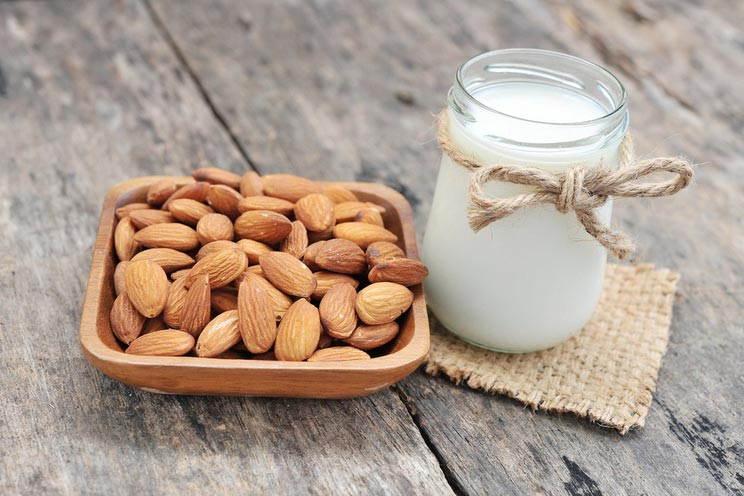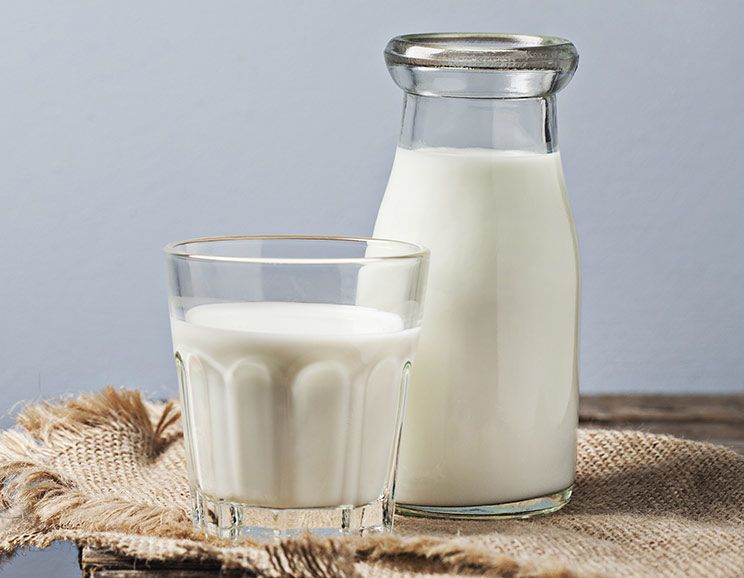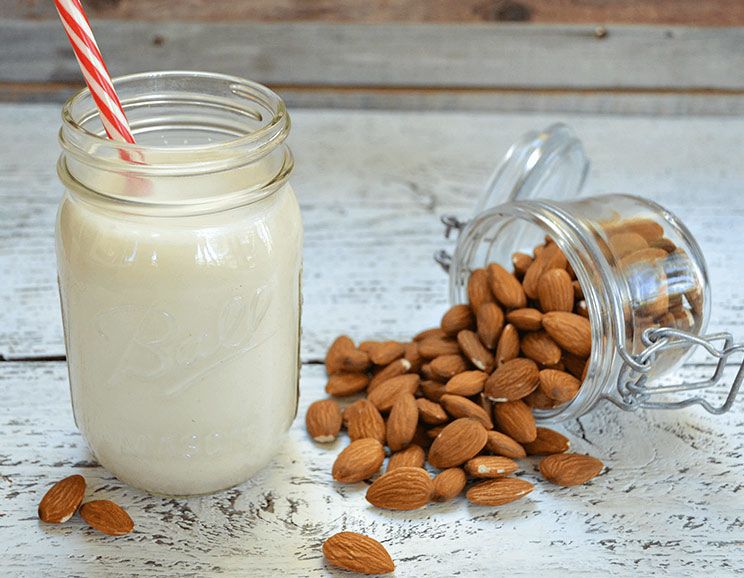Is almond milk really superior to real dairy? Here’s why almond milk does a body good, and how you can make it at home to save cash.
A few years ago, the only milk on the market was the kind the came straight from a dairy cow.
Today however, we have access to an entire non-dairy milk section at the market, featuring all kinds of “milk” made from nuts and seeds.
Love Almond Flour Recipes? Then you’ll love our FREE Almond Flour Recipes.
Click here to get your FREE copy of our delicious Almond Flour Recipes!
Almond milk is one of the most popular dairy replacements to cow’s milk. Keep reading to discover its benefits.
What Is Almond Milk?

Almond milk is made by simply blending almonds with water. When this happens, the inner flesh of the almonds is immersed into the water, turning it milky white. Most of the vitamins and minerals in the almonds remain in the milk after the blend is strained, giving you all the benefits of almonds in liquid form. Think of it as similar to juicing your vegetables and greens.
Almond Milk Nutrition Info
Almond milk contains an impressive amount of vitamins and minerals. A 1 ounce serving of almonds has: (1)
- 161 calories
- 14 grams of fat (9 monounsaturated)
- 6 grams of carbohydrates
- 3.5 grams of fiber
- 6 grams of protein
- Vitamin E: 37% of the RDA
- Manganese: 32% of the RDA
- Magnesium: 20% of the RDA
Almond Milk vs. Dairy Milk

For decades, cow’s milk was the iconic beverage of choice in households. It was often advertised to help build strong bones and teeth due to its high calcium and vitamin D content. Cow’s milk was also recommended for growing kids due to its protein content and marketed as an essential part to cereal.
However, even though cow’s milk is a great source of protein and calcium, there are several scary reasons not to indulge in cow’s milk.
The first of these reasons is that commercial dairy milk is often loaded with hormones given to cows to help them produce more milk. This can in turn disrupt our own hormones, and even result in the development of cancer. (2)
In addition, cow’s milk in the U.S. is almost always pasteurized with high heat, which destroys many of the beneficial probiotics and vitamin A that may have been present in the first place. (3)
Finally, milk allergies are one of the most common allergies due to the presence of the proteins lactose and casein found in milk, which our bodies lack the enzymes necessary to digest fully. (4)
Almond milk, on the other hand, is free from hormones and common proteins that cause allergies. Plus, almond milk is lower in calories than dairy milk and is often fortified with extra calcium.
6 Benefits of Almond Milk
1. Almond Milk Fights Aging
Almonds are bursting with vitamin E, with one ounce providing a whopping 37 percent of your daily intake. (5) This is great news when it comes to making us look younger, since antioxidants like vitamin E are powerhouses when it comes to fighting free radicals. Free radicals are the molecules from our environment and diet that damage DNA and cause wrinkles and other signs of aging.
Studies show that eating just three ounces of almonds a day can reduce oxidative stress (damage caused by free radicals) in as little as four weeks. (6)
2. Almond Milk Keeps Your Brain Healthy

Additionally, the vitamin E content in almond milk plays a key role in brain health. This is because oxidative stress from free radicals is highly damaging to your brain, and plays a key role in the development of many neurological diseases, including Alzheimer’s and dementia.
In addition, studies found that people who consume more vitamin E experience less cognitive decline than those who don’t get enough. (7)
3. Almond Milk Helps Control Blood Sugar
Provided it has no added fillers, almond milk is low in carbs and sugar and higher in fat and protein. This makes almond milk a great choice for diabetics and those with blood sugar issues.
It’s also high in magnesium, which can help reduce insulin resistance even in people who don’t have diabetes. And, as it turns out, researchers have found that 25-38 percent of diabetics are deficient in magnesium. (8, 9)
4. Almond Milk Can Help You Lose Weight

Interestingly, roughly 10-15 percent of the calories in nuts are not absorbed by the body. (10) Almonds are also more filling than many other starchy snacks, making them excellent for weight loss.
One study found that overweight women who consumed almonds lost more weight than those going nut-free and reduced their waist circumference. Other studies show that nuts can even increase your metabolism. (11, 12)
5. Almond Milk Improves Cholesterol
The antioxidants in almonds can help prevent the oxidation of cholesterol, which is important when it comes to chronic inflammation and developing coronary heart disease. (13)
In addition, studies show that snacking on almonds for just one month can reduce LDL (bad) cholesterol by up to 14 percent. (14)
6. Almond Milk May Help Prevent Cancer
Almonds are rich in monounsaturated fat, which studies show to be associated with a lowered risk of developing endometrial cancer, as well as a decreased risk of a rare form of liver cancer. (15, 16)
The fact that almonds contain high levels of free-radical fighting antioxidants suggests they have the potential to help prevent cancer, since free radicals damage DNA and can lead to cancer development. (17)
How Is Almond Milk Made?

While the base ingredients of almond milk should be 100 percent natural and Paleo, keep in mind that many commercial companies add thickeners, gums, and sugar to their almond milks in order to make them creamier and tastier. You’ll want to avoid almond milks that contain these additional ingredients, as many, like the thickener carrageenan, is linked to gastrointestinal inflammation and even increased risk of developing colon cancer. (18)
The easiest way to make sure you’re not getting any added synthetic ingredients in your milk is to whip up your own. Luckily, the process is easy! Almonds and water are simply blended together until a white “milk” is formed, then the almond bits are strained out.
For a step-by-step guide on how to easily (and cheaply) make your own almond milk, click this link.
Who Should Not Drink Almond Milk?
People who have allergies to nuts and tree nuts should avoid almond milk. In addition, studies show that some people have developed kidney stones from consuming too much oxalate found in almond milk. (19) In this case, it’s best to consume almond milk in moderation.
The Bottom Line
In all, almond milk is an excellent swap for cow’s milk in your diet, especially if you’ve been dealing with digestive issues and food allergies that could be contributed to dairy milk.

(Read This Next: The Pros and Cons of Dairy Milk)


 No-Bake Hazelnut Butter Pie
No-Bake Hazelnut Butter Pie








Show Comments